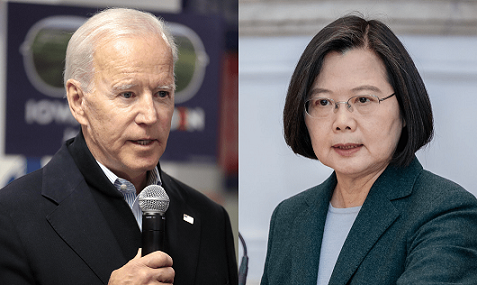In late 2011, Tsai Ing-wen, a presidential candidate in Taiwan, met with two Obama administration officials in Washington, a customary step for office-seekers on an island that depends heavily on the United States for its security. She didn’t win their approval.
Hours after the K Street breakfast, the White House told reporters the administration had “concerns” about Tsai’s candidacy and the possibility she might antagonize Beijing. The U.S. concerns hobbled Tsai, who lost in 2012 but became president in 2016.
“It was traumatic,” said a former aide to Tsai, speaking on the condition of anonymity to discuss a private meeting.
Today, roles have reversed. Weighing the possibility of a Democratic victory in the U.S. presidential election, current and former officials in the Taiwanese government and Tsai’s Democratic Progressive Party (DPP) have privately expressed concern that a return of Obama-era foreign policy advisers in a potential Biden administration could mean a U.S. approach that is more conciliatory toward China compared with the Trump administration’s — and less supportive of Taiwan.
The three-way relationship among the United States, China and Taiwan is potentially explosive and figures prominently in the calculus for every U.S. president’s China policy. China claims Taiwan, a self-ruled democracy, as territory that it will one day bring under its control and has signalled it could go to war if Taipei were to cross certain red lines, such as formally declaring independence.
Although Democratic and Republican administrations have favoured a cautious approach to cross-strait relations in recent decades, President Trump shattered diplomatic norms, increased travel and exchanges with Taiwanese officials and elevated the island’s international profile in ways that have drawn praise from the DPP and sabre-rattling from Beijing under President Xi Jinping.
Trump has also approved weapons sales to Taiwan totalling more than $15 billion, including coveted F-16 jets that frustrated Taiwanese hawks say Presidents Barack Obama and George W. Bush withheld.
The November election is “a big, big uncertainty,” said Lai I-chung, president of the Prospect Foundation think tank and former DPP foreign policy director.
“It seems Jake Sullivan and Tony Blinken still view Taiwan as a problem that needs to be handled within the greater U.S.-China relationship. And what has Susan Rice written about China or Taiwan?” Lai said, ticking off a few Obama administration officials who could return to prominent roles. “The lack of the deeper understanding on the issue of Taiwan by Biden advisers is something that causes a lot of concern here.”
Taiwanese support for Trump extends beyond the government. October polls by YouGov showed Taiwan to be the only one out of 15 European and Asian states that favoured Trump over Biden. Prominent Taiwanese bloggers and pundits who criticize the president as eroding U.S. institutions and global standing are frequently attacked by swarms of “chuan fen” — Trump fans — who argue the Chinese Communist Party presents a greater existential threat.
Despite professing uncertainty, Taiwanese officials say they are hopeful the consensus view in Washington, particularly on Capitol Hill, has fundamentally shifted over the past four years in light of President Xi’s crackdowns on dissent in Xinjiang, Hong Kong and elsewhere and his assertive diplomatic posture in Asia and Europe.
After the 2011 snub by Obama aides, DPP officials said the party invested heavily in wooing Democrats rather than begrudging them. In 2013, the DPP opened an office in Washington and dispatched Tsai confidants, including Joseph Wu and David Lee, the current foreign minister and presidential chief of staff, to woo Democrats and Republicans. More recently, Taiwan’s new envoy to Washington, Bi-khim Hsiao, has ramped up outreach efforts to the Democrats as she has sought to sound out how certain advisers in Biden’s circle would influence China policy, according to people familiar with the meetings.
In recent weeks leading up to the election, Tsai has appeared to refrain from drawing even closer to the Trump administration and has struck a conciliatory note toward Beijing. She’s been the stabilizing corner of the US-PRC-Taiwan triangle.


